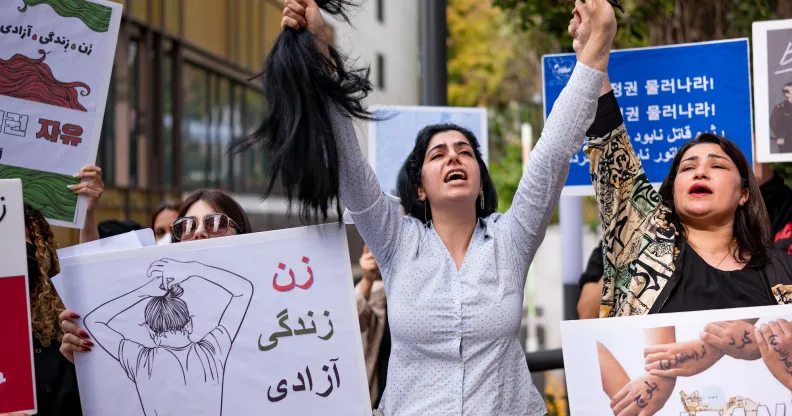Protest-hit Iran abolishes hated ‘morality police’ after months of protests

A member of the Iranian community in Seoul cuts her hair outside the Embassy of the Islamic Republic of Iran. (NurPhoto / Chris Jung)
Iran has abolished its brutal ‘morality police’ after months of protest over the death of 22-year-old Mahsa Amini in custody.
Amini was arrested by Iran’s religious morality police, officially known as the ‘Gasht-e-Ershad’ or ‘Guidance Patrol’, for “improper hijab”. She later died, and though government officials claimed she suffered a heart attack, witnesses who were detained with her say she was severely beaten by police and died as a result.
Her death sparked widespread anti-government protests in Iran, and further protests across the world, with women removing their hijab, burning them, and publicly cutting their hair.
Police have violently enforced public “morality” since the formation of the Islamic Republic of Iran following the 1979 revolution, but the morality police became a separate entity from other law enforcement in the 1990s. It has existed in its current guise since 2006.
The morality police focuses mostly on enforcing laws surrounding modesty and dress for women, although it also detains Iranians for the consumption of alcohol, attending mixed-gender gatherings, and being LGBTQ+.
Assal Rad, research director at the National Iranian American Council, told TIME: “If [clothing] is too tight, if the body shows too much, if your sleeves are up, if your jeans are torn, they will take you to a detention centre… until someone comes and brings you the [appropriate clothes].”
Though she was far from the first woman to die at the hands of Iran’s morality police, Amini’s death sparked such a huge response because “it could have been anybody”, Rad said.
“Millions of Iranian women wear this hijab loosely. This has almost become standard practice.”
On Saturday (3 December), Iran’s Attorney General Mohammad Jafar Montazeri was asked about the morality police during a religious conference.
In response, he claimed that “morality police have nothing to do with the judiciary”, and that it had been disbanded.
However, there is little hope of meaningful reform, experts have said.
Geopolitical analyst Michael Horowitz tweeted: “The Iranian Attorney General has announced the closure of the morality police (the same morality police that beat Mahsa Amini to death). Other Iranian security entities continue to kill protesters.
“This may be meant to be seen as a ‘concession’ to protesters, but it does not change the overall situation. The Iranian police, [the volunteer militia] Basij and [Islamic Revolutionary Guard Corps] are still killing protesters, and the morality police’s fate was likely sealed weeks ago. The Iranian regime will not reform itself.”
Horowitz noted that at the same time as announcing the abolition of the morality police, Iran’s Attorney General also called for more “cultural activities” to promote hijab.
“More broadly, when it comes to quelling a popular movement, false concessions are typically accompanied by real crackdowns (or expansion of pre-existing crackdowns),” he added.
In September, the same month that Amini died, two activists in Iran were sentenced to death for “promoting homosexuality”.
Zahra Sedighi-Hamadani, 31, and Elham Choubdar, 24, were found guilty of “spreading corruption on earth”, according to local human rights groups.
Amnesty International has called on Iranian authorities to “immediately quash” their convictions and death sentences, though as yet, there has been no move to do so.

